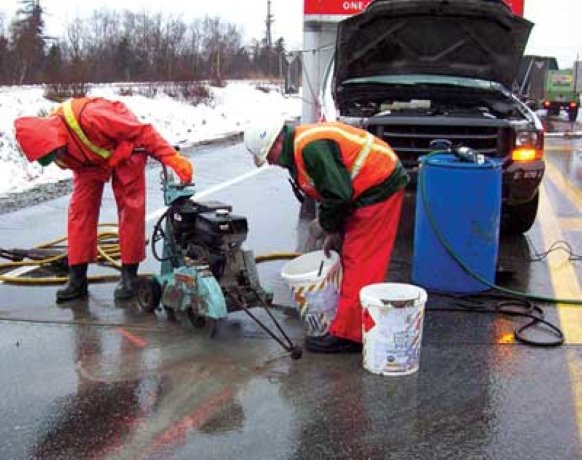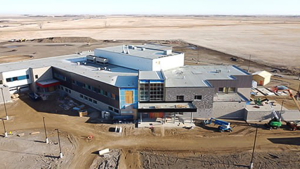St. John’s, Newfoundland is known for unpredictable winter weather. Three years ago, the city chose weather forecaster AMEC to help develop a Road Weather Information System (RWIS) that keeps running tabs on road conditions while providing predictions of future conditions around the clock.
Innovation
St. John’s, Newfoundland is known for unpredictable winter weather.
Three years ago, the city chose weather forecaster AMEC to help develop a Road Weather Information System (RWIS) that keeps running tabs on road conditions while providing predictions of future conditions around the clock.
At the heart of the system is a puck-shaped sensor, inserted into the pavement at strategic locations. The sensor monitors road surface conditions, including temperature, presence of water and/or ice on the road, the presence of road salt, and the freezing temperature of any surface liquid.
The sensors are linked to roadside towers that monitor wind speed and direction, precipitation, temperature, and barometric pressure, then beam the information to AMEC meteorologists who interpret the data and send updates to the city road maintenance department, assisting staff to make better decisions about deploying crews, plows and salt trucks.
While other companies provide similar services, the city chose AMEC because it offered to install and maintain all of the necessary equipment, says Jim Clarke, Manager of Streets and Parks, St. John’s.
“We didn’t want to own the equipment. We’re in the business of maintaining roads, not weather forecasting equipment.”
“It takes 10 times as much salt to remove road ice than it does to stop it from forming in the first place,” says AMEC meteorologist Stephen Green.
“While one of our goals is to reduce the application of salt, the use of RWIS also proves that road operators are acting with due diligence. Once the technology becomes available to improve public safety, road users have the right to expect that the technology will be used.”
The technology is particularly effective when air temperatures and actual road temperatures differ. “Sometimes it’s freezing out, but the road is still warm, so no maintenance is required,” says Green. “At other times, it’s warmer out, but the sensors tell us the road is freezing.”
The city of St. John’s continues to demand greater and greater accuracy from road condition reports, including real-time data feeds and more accurate forecasts — AMEC is penalized if predictions fall outside a certain range of accuracy.
“If they tell us there’s snow coming between 9 p.m. and midnight, we want to know if it’s coming at 10 o’clock or 11 o’clock,” says Clarke.
“We need instant notice of any significant change in the forecast that would dictate an increase or decrease in staff or equipment deployment. When we’re fully deployed, road maintenance costs us $15,000 to $20,000 per hour, so every hour counts.”
Despite all the monitoring of the system, officials find it difficult to say whether or not it has saved the city money. “Our salt consumption has dropped dramatically,” says Clarke.
“But we’ve also started a number of other initiatives at the same time, including pre-wetting and anti-icing sprays. But the system wasn’t implemented as a cost-saving measure. It was more about public safety and using resources effectively.”
St. John’s recently signed a new five-year deal with AMEC, which now operates similar services in Ontario, Nova Scotia, New Brunswick and PEI. The company hopes to use its expertise to offer RWIS internationally. “Canada, in general, and Newfoundland, in particular, are perceived as having unpredictable weather, so our Canadian experience is building a good reputation for us,” says Green.
His reputation with his next-door-neighbour, on the other hand, is suffering.
Says Green, “He’s on a road maintenance crew, and the forecasts are killing his overtime.”











Recent Comments
comments for this post are closed